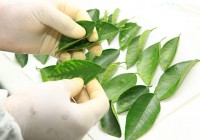21
jun

Brazilian full professor in California, Mr. Walter Leal coordinated the research that identified the molecule attractive to the psyllid.
For more than two decades, researcher Walter Leal has been considered as one of the world’s leading specialists in chemical ecology and insect olfaction. In the 2000s, Mr. Leal joined the team that identified the pheromone of the citrus fruit borer, one of the worst citrus pests at the time. Currently, he coordinates the project that looks for attractive odors to the psyllid. In 2017, the group made an important discovery for citriculture: the identification of the sexual pheromone of the psyllid, the transmitting insect of citrus greening.
With this work, the expectation is that in the future the pheromone can be put in the traps to attract the psyllid, and thus help in managing the citrus greening effectively. Among the benefits of this type of research for citriculture and the environment are the use of measures that could reduce agrochemicals for disease management. “I’m also very happy to see the genuine interest in using techniques that are kinder to the environment, such as the use of biological control products, pheromones and other semiochemicals,” says the researcher.
According to Mr. Leal, identifying the odor that attracts the psyllid is an important step in controlling the disease. “I see it as a very important milestone.” Now the project follows two parallel directions: one should study the issue of pheromone formulation, how to apply it to a material that can be placed in the traps in the field, while the other front will work focusing on improving the attractiveness. “We can compare this to a software. After the development of the software, new versions come up, because we work to improve it more and more,” explains the researcher. And he concludes: “I think citriculture is on the right track, investing in research and trying to fight the problems that come up.”
Source: Fundecitrus
- |

